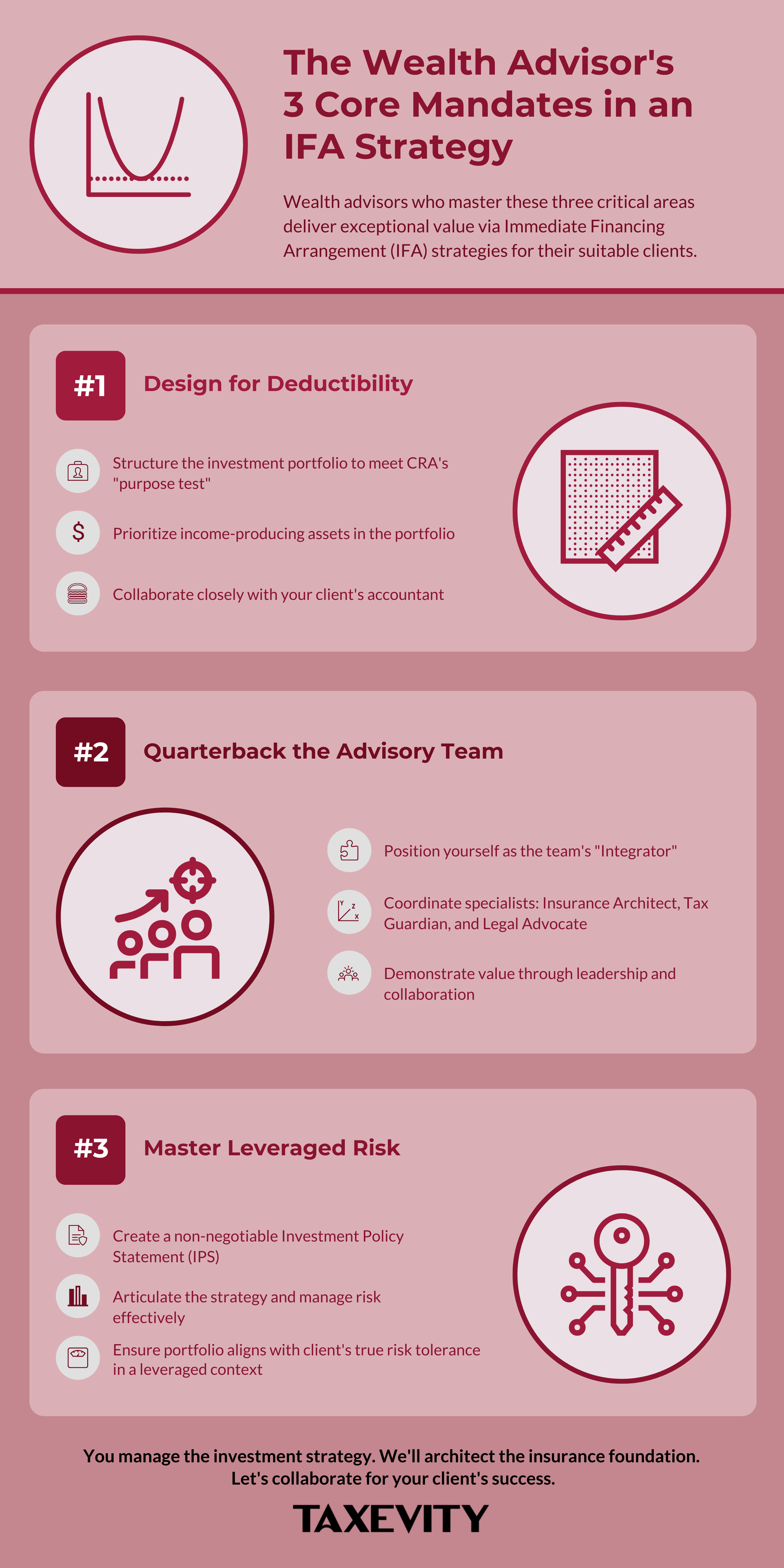(Part of the IFA Master Curriculum)
Key Question for Wealth Advisors
An Immediate Financing Arrangement (IFA) elevates your role beyond traditional investment management. How do you meet this opportunity by structuring a compliant portfolio, managing the unique risks of leverage, and leading the advisory team to success?
- The Leveraged Risk: Leverage magnifies both gains and losses, so your client’s true risk tolerance may be different in this context. A non-negotiable Investment Policy Statement (IPS) is required to articulate the strategy and manage this risk effectively.
- The Compliant Portfolio: The strategy’s success depends on the loan interest being deductible. Your core mandate is to design an investment portfolio that meets the CRA’s “purpose test” by prioritizing income-producing assets, a task requiring close collaboration with the client’s accountant.
- The Leadership Opportunity: You are perfectly positioned to act as the team’s “Integrator” or “quarterback”, coordinating the other specialists—the Insurance Architect, Tax Guardian, and Legal Advocate. Leading this collaboration demonstrates immense value and solidifies your position as the client’s lead advisor.
As a wealth advisor to high-net-worth clients, you are constantly seeking strategies that offer superior, tax-efficient returns. An Immediate Financing Arrangement (IFA) is one of the most powerful tools available, but its complexity requires more than just sound investment management—it requires strategic leadership.
In an IFA, your role evolves. You are not just managing a portfolio; you are the Strategist for the leveraged assets and, often, the Integrator for the entire Core Advisory Team. This guide focuses on your specific function within that team, a topic we introduce in our main hub post, The IFA Core Advisory Team: A Requirement for Success.
Embracing this expanded role allows you to demonstrate immense value, protecting your clients from risk while solidifying your position as their lead advisor.

Your Primary Mandate: The Investment Strategist
The success of an IFA’s investment component rests on a delicate balance: achieving growth while maintaining strict tax compliance. This is your core technical mandate.
- Designing for the “Purpose Test”: The interest on the IFA loan is only deductible if the borrowed funds are invested with a “reasonable expectation of earning income.” This means a portfolio focused solely on capital gains may not qualify. Your strategy must prioritize income-producing assets like dividend-paying stocks or interest-bearing securities. This is a critical point of collaboration with the client’s accountant, who must be able to defend this to the CRA. For a deeper look, see our Wealth Advisor’s Companion to Leveraged Investing.
- Managing Leveraged Risk: Leverage magnifies both gains and losses. Your role includes stress-testing the portfolio against market downturns and ensuring the investment strategy aligns with the client’s true risk tolerance, which may be different in a leveraged context.
- Clear Communication: A well-defined Investment Policy Statement (IPS) is non-negotiable. It should clearly articulate the strategy, the income-earning objective, and the risk management protocols, ensuring you, your client, and their accountant are all aligned.
Your Strategic Opportunity: The Team Integrator
Beyond managing the assets, you have the opportunity to act as the team’s Integrator or “quarterback”. Because you often have the most holistic view of the client’s financial life, you are perfectly positioned to coordinate the other specialists.
- Leading the Collaboration: This involves scheduling joint meetings with the Insurance Architect, Tax Guardian, and Legal Advocate. It means ensuring everyone is working from the same set of assumptions and that communication flows freely.
- Overcoming Inertia: The complexity of an IFA can lead to client procrastination. As the Integrator, you can drive the process forward, keeping the team on track and ensuring the strategy moves from plan to execution.
- Guiding the Team Selection: You can help your client vet other advisors, ensuring that the insurance specialist has the requisite modeling expertise and that the legal counsel understands the nuances of collateral loan agreements.
Conclusion: Differentiate Your Practice
In a competitive market, leading a client through a successful IFA strategy is a powerful differentiator. You demonstrates a level of expertise that goes far beyond traditional investment management. By embracing the dual roles of Strategist and Integrator, you protect your client from significant risks and also become the indispensable centre of their financial world. For more on this, see our guide on Integrating IFAs into Your Wealth Advisory Practice.
At Taxevity, we specialize in acting as the Insurance Architect, providing the sophisticated modeling and policy design that forms the foundation of the IFA. We are built to collaborate seamlessly with expert wealth advisors like you.
Ready to lead the team? If you have a client who is exploring an IFA or may be a suitable candidate, contact us. Let’s discuss how we can work together to deliver this high-value strategy.





